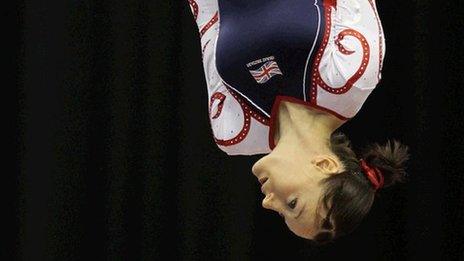World Gymnastics: Max Whitlock aims to learn from Japanese
- Published
Max Whitlock wins silver at World Gymnastics Championships
Max Whitlock, deprived of a world title on the pommel horse by Japan's Kohei Kameyama, is on a quest to raise his game to Japanese standards.
Led by Kohei Uchimura, the gymnastics sensation who is not only the Olympic all-around champion but also holds the past four world titles, Japan's men have returned to the pinnacle of global gymnastics.
Not since Tokyo 1964's Olympic gold medal-winning team, led by the great Yukio Endo, has a Japanese squad exhibited this kind of talent: Kameyama, Uchimura, Kenzo Shirai (17-year-old master of the world's most difficult floor routine) and Ryohei Kato (silver in the all-around behind Uchimura).
Of seven men's gold medals on offer, Japan won four.
"Seeing these amazing gymnasts like Uchimura and the rest of the Japanese team really motivates me," Whitlock told BBC Sport as he watched Uchimura collect gold on the parallel bars.
"Their style is so different to any other country - the look, the moves, the techniques. It's partly their calm and chilled attitude as well, I admire that."
Whitlock, 20, won two Olympic bronze medals last year - one in the team event, the other on the pommel horse.
Louis Smith competed alongside him in both, winning pommel horse silver. Smith believes Whitlock has the attitude, and now needs to match the Japanese for grace and elegance.
"I have no doubt that at the next World Championships he can win gold medals. He's very laid-back, he's very chilled - exactly how I was," said Smith, who commentated on Whitlock's world silver medal in Antwerp.
"He doesn't need a more difficult routine. There becomes a limit in terms of what you can actually do on the pommel horse. When you're the best in the world and you're making world finals, there's not much you can put into that routine to make it any harder, so don't think about that.
"Is Max the cleanest in the world right now? No. Does he have one of the hardest start scores in the world? Yes. It's obvious that he needs to work on tidying up his game.
"He knows possibly only five other guys can match his difficulty. What he needs to do is polish. Make that routine clean, make it perfect, that's what we strive to do. It boils down to repetition."
Whitlock said: "I came out here to try a big routine. That was the whole point of it, to gain more experience. I want to use this routine in as many major competitions as I can. Hopefully, in the future, I'll feel more confident."
Whitlock wants pommel horse gold, but he also harbours the ambition of becoming a pre-eminent all-around gymnast.
His fourth-place finish in an all-around final of exceptional calibre was an excellent world debut. He is already planning to "get straight back into it" in the gym.
"After competitions I write stuff down - the new skills I want when I get back, the things I need to work on," he said.
"The more I watch [other gymnasts], the more I pick up little things. It really does help. I'm looking forward to getting back in the gym and trying some new stuff."
While Whitlock works out how to maintain his remarkable rise, Kristian Thomas can celebrate his reward for years of largely unnoticed hard graft in the heart of the British men's team.
When Britain won team bronze at London 2012 - just behind Japan - Thomas played a key role, contributing a huge vault score to the cause.
Now, for the first time, he reproduced that form as an individual on the world stage, vaulting to bronze in Sunday's final - just as he had started to wonder if a world medal would ever come.
"Max Whitlock is a perfect example," said the 24-year-old from Wolverhampton. "It's his first World Championships and he came away with a medal. This is my fifth Worlds, and I'd never made a world final before now.
"I'm glad I made the most of it and didn't waste a great opportunity.
"I want to go back into the gym and work hard on improving my second vault. If I can do that, that puts me right up there with the best in the world. I like to think this has put me in a good position moving towards the Rio Olympics."
- Published5 October 2013
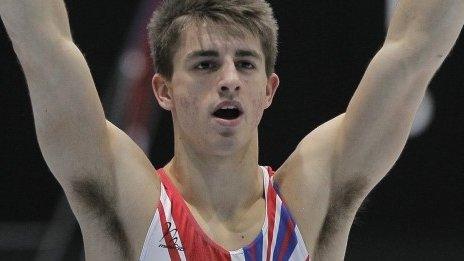
- Published6 October 2013
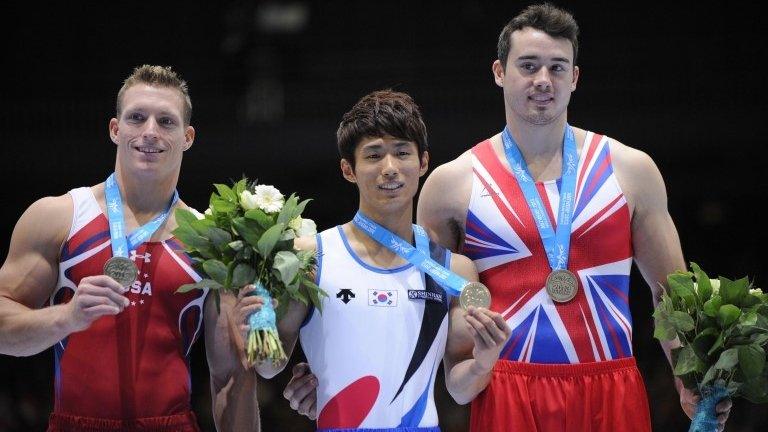
- Published5 August 2012
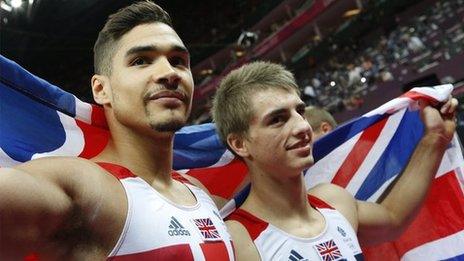
- Published30 July 2012
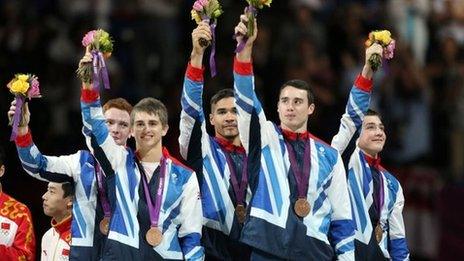
- Published29 August 2014
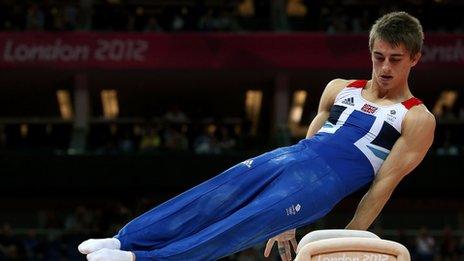
- Published29 August 2014
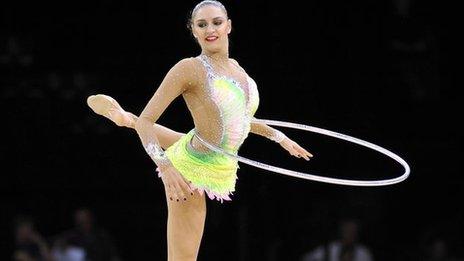
- Published29 August 2014
